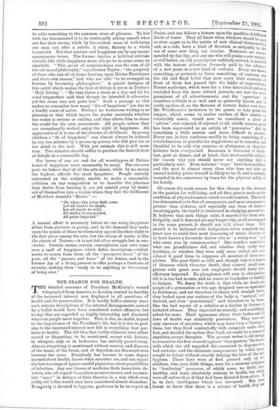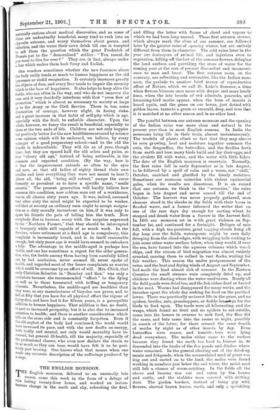THE SEARCH FOR HEALTH.
THE detailed accounts of President McKinley's wound telegraphed from America to London remind us forcibly of the increased interest now displayed in all questions of health and its preservation. It is hardly half-a-century since such minute descriptions of the internal derangements caused by a bullet would have been considered rather offensive, but to-day they are regarded as highly interesting and discussed wherever people meet together. That is due, no doubt, in part to the importance of the President's life, but it is due in part also to the increased interest now felt in everything that per- tains to health. The old idea that bodily ailments were either sacred or disgusting, to be mentioned, except with doctors, in whispers only or in bedrooms, has entirely passed away. Almost everything is mentioned without reserve, and diseases of the heart, of the brain, and of digestion are discussed even between the sexes. Everybody has become in some degree learned about health, knows what microbes are, and can repeat the last warnings of hyper-careful physicians about possibilities of infection. Any new theory of medicine finds immediate de- votees, who all regard themselves as missionaries, and accumu: late "cases" in defence of their theories in a way which even sickly old ladies would once have considered almost shameless. Everybody is devoted to hygiene, professes to be an expert in drains, and can deliver a lecture upon the qualities of diff kinds of water. They all know when windows should be open or shut, argue as to the merits of new clinical thermometers, and, as a rule, have a kind of devotion or antipathy to th use of some new drug. say cocaine. Nostrums are venom! mended by fair lips, and any one who will praise a new remedy, or still better, an old prescription suddenly revived, is received. with the instant attention formerly paid to the advocate of a new game or a new kind of costume. Every one know3 something, or pretends to know something, of anatomy, and the old and fixed belief that men carry their stomachs in front of them has passed into the limbo of superstitions. Patent medicines, which were for a time discredited and even excluded from the more refined journals, are now the mot: prominent of all advertisements, and the "operation" of countless tabloids is as well and as generally known, and as coolly spoken of, as the flavours of certain dishes ever were. Mr. Woodhouse's invitation to his guests to take gruel for supper, which seems to earlier readers of Miss Austen so irresistibly comic, would now be considered a - piece of " advice," and rejected, if rejected at all, chiefly because gruel has been superseded as an article of " preventive" diet by something a little nastier and more difficult to procure. Every one, in fact, confesses readily to being something of a valetudinarian, is grateful for suggestions as to remedies, and thankful to be told why exercise, or abstinence, or sleep hat hitherto been overpraised. Insomnia is discussed at break. fast, gout at dinner, and at lunch that inexhaustible subject, the reason why you shbuld never eat anything that is particularly nice. Even national " ways " have been modified, and the man in almost every class who does not take an annual holiday pities himself as likely to be ill, and is actually wounded in his conscience by fears for the physical safety of his family.
Of course the main reason for this change is the increase in the passion for well-being, and all that goes to make up the condition of physical content which we call comfort. The world has determined to be free of annoyances, and as no annoyance is greater than sickness, and especially any form of sickness involving pain, the world is interested in studying preventives It believes that such things exist, it searche; for them inde- fatigably, and it does not see any longer why, as all are engaged in the same pursuit, it should not talk about them. Why should it be bothered with indigestion when somebody may know how to avoid that most harassing of minor diseases, or at least knows a favourite doctor who is "a rising man and who cures you by common-sense ? One wonders sometimes what our grandfathers did, and whether they really wen healthier, or whether they were only more stoical, and con• sidered it good form to suppress all mention of their com- plaints. The poor think so still, and though vain to a degree of illnesses which threaten death, they conceal small com- plaints with great care lest employers should fancy their efficiency impaired. No.ploughman will own to rheumatism till it is too bad to cure, and no nurse to headaches or liability to fatigue. We fancy the' truth is that while, no doubt, the people of .a generation or two ago despised ease as equivalent to feebleness, and sat therefore in chairs with straight backs, they looked upon any malaise of the body as "natural," self' derived, and even " providential," and therefore to be home like the bad repute of a relative or a decline in fortune, in irritated silence. They expected no remedy, and accordingly asked for none. Their ignorance about their bodies and all laws of health was absolutely portentous. They were net only unaware of microbes, which may have been a blessing to them, but they lived contentedly with cesspools under their feet, and derided the notion that fresh air could be a source of anything except draughts. The present writer is old enough to remember the first crusade against " four-posters," the horror with which the old regarded the command to dispense with bed curtains, and the elaborate compromises by which man)" sought to defeat without exactly defying the laws of the no hygiene. Those laws were at first pressed only cm the children, who, poor little things, were for a moment subjected to " har. dening " processes, of which some, no doubt, were healthy, and some absolutely ruinous to health, but which were all enforced as if they had been dictated from above. It is, in fact, intelligence which has increased. Men have learnt to know that there is a science of health, they are naturally curious about medical discoveries, and as some of these are undoubtedly beneficial, many tend to rush into an opposite extreme, and worry themselves about germs, and infection, and the water their cows drink till one is tempted to ask them the question which the great Frederick of Pr11.8131a put to the " demoralised " soldier : " You rascal, do yon want to live for ever P " They are, in fact, always under a fear which makes them look fussy and foolish.
One wonders sometimes whether the new fussiness about the body really tends as much to human happiness as the old inorance or stolid resignation. It certainly increases greatly the objects of fear, and every fear tends to impair the serenity which is the base of happiness. It also helps to keep alive the feeble, who are often in the way, and who do not improve the race, and it very decidedly interferes with that " even flow of promotion" which is almost as necessary to society at large as to the Army or the Civil Service. There is, too, some diminution of courage, however slight, in facing risks, and a great increase in that habit of, self-pity which is apt, especially with the frail, to enfeeble character. Upon the whole, however, we fancy the result is beneficial, especially to those at the two ends of life. Children are not only happier but positively better for the new healthiness secured by science —an opinion which will be endorsed, we believe, by every manager of a good preparatory school—and to the old the benefit is indescribable. They will die as of yore, though later; but they are spared half the old aches and pains, so that "cheery old age," instead of being noticeable, is the common and expected condition. (By the way, how is it that the improvement extends so often to the eyes and ears, so that old ladies of eighty thread their own needles and hear everything they were not meant to hear ?) Above all, the old, " being still robust," escape the curse formerly so prevalent as to have a specific name, " senile amentia." The present generation will hardly believe how common this condition, now seldom seen out of a workhouse, was in all classes sixty years ago. It was, indeed, assumed that after sixty the mind might be expected to be weaker, and that at seventy an ordinary man ought to accept resigna- tion as a duty morally incumbent on him, if it was only to spare his friends the pain of telling him the truth. Now everybody dies in harness, many with the surprise expressed by the " Northern Farmer," that they should be interrupted so brusquely while still capable of so much work. In the Services, where retirement at a fixed age is compulsory, this complaint is incessantly heard, and is in itself reasonable enough; but sixty years ago it would have seemed to onlookers a folly. The advantage to the middle-aged is perhaps less visible, and one has sometimes a regret for the older genera- tion, who, the feeble among them having been carefully killed out by bad sanitation, never seemed ill, never spoke of health, and regarded most of the lesser complaints as worries which could be overcome by an effort of will. -Mrs. Chick, that early Christian Scientist in " Dombey and Son," was only a caricature because she recommended " effort " to the dying as well as to those tormented with trifling or temporary ailments. Nevertheless, the middle-aged are healthier than they were, as any manufacturer of bicycles can prove, and to feel at fifty that you have for all physical effort the vigour of thirty-five, and have had it for fifteen years, is a perceptible addition to human happiness. That addition is due, no doubt, in part to increased prosperity, but it is also due to increased attention to health; and there is another consideration which tells on the same side and is constantly forgotten. Even if the old neglect of the body bad continued, the world would have increased its pace, and with the new drafts on energy, both bodily and mental, not only would mortality have in- creased, but general ill-health, till the majority, especially of the professional classes, who even now declare the strain to he as much as they can bear, would have felt it to be posi- tively past bearing. One knows what that means when one reads any accurate description of the sufferings produced by a siege.







































 Previous page
Previous page